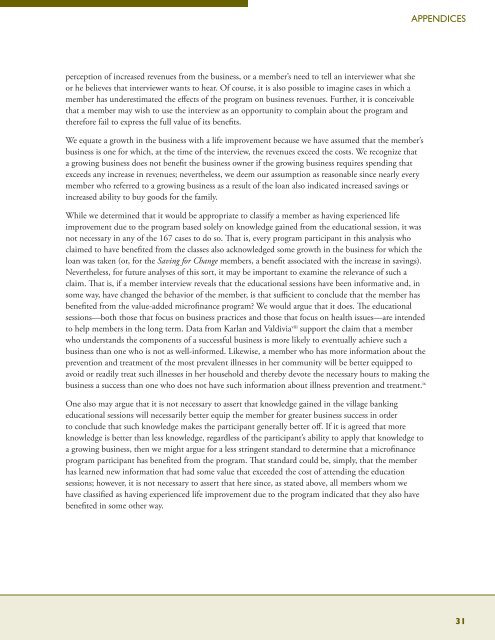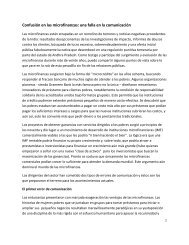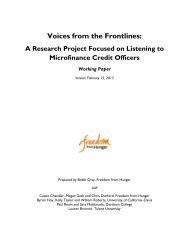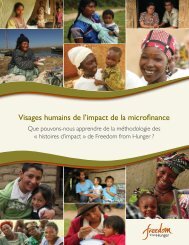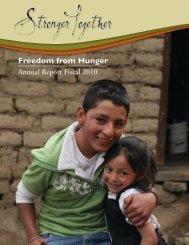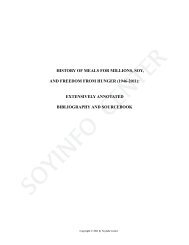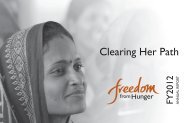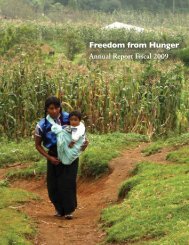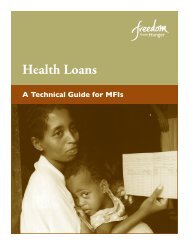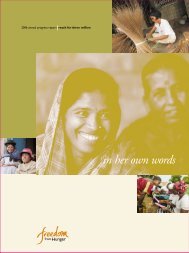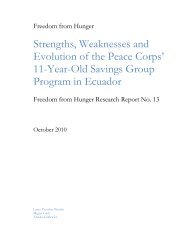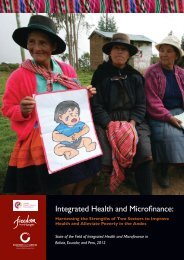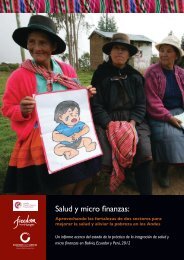English - Freedom from Hunger
English - Freedom from Hunger
English - Freedom from Hunger
You also want an ePaper? Increase the reach of your titles
YUMPU automatically turns print PDFs into web optimized ePapers that Google loves.
perception of increased revenues <strong>from</strong> the business, or a member’s need to tell an interviewer what she<br />
or he believes that interviewer wants to hear. Of course, it is also possible to imagine cases in which a<br />
member has underestimated the effects of the program on business revenues. Further, it is conceivable<br />
that a member may wish to use the interview as an opportunity to complain about the program and<br />
therefore fail to express the full value of its benefits.<br />
We equate a growth in the business with a life improvement because we have assumed that the member’s<br />
business is one for which, at the time of the interview, the revenues exceed the costs. We recognize that<br />
a growing business does not benefit the business owner if the growing business requires spending that<br />
exceeds any increase in revenues; nevertheless, we deem our assumption as reasonable since nearly every<br />
member who referred to a growing business as a result of the loan also indicated increased savings or<br />
increased ability to buy goods for the family.<br />
While we determined that it would be appropriate to classify a member as having experienced life<br />
improvement due to the program based solely on knowledge gained <strong>from</strong> the educational session, it was<br />
not necessary in any of the 167 cases to do so. That is, every program participant in this analysis who<br />
claimed to have benefited <strong>from</strong> the classes also acknowledged some growth in the business for which the<br />
loan was taken (or, for the Saving for Change members, a benefit associated with the increase in savings).<br />
Nevertheless, for future analyses of this sort, it may be important to examine the relevance of such a<br />
claim. That is, if a member interview reveals that the educational sessions have been informative and, in<br />
some way, have changed the behavior of the member, is that sufficient to conclude that the member has<br />
benefited <strong>from</strong> the value-added microfinance program? We would argue that it does. The educational<br />
sessions—both those that focus on business practices and those that focus on health issues—are intended<br />
to help members in the long term. Data <strong>from</strong> Karlan and Valdivia viii support the claim that a member<br />
who understands the components of a successful business is more likely to eventually achieve such a<br />
business than one who is not as well-informed. Likewise, a member who has more information about the<br />
prevention and treatment of the most prevalent illnesses in her community will be better equipped to<br />
avoid or readily treat such illnesses in her household and thereby devote the necessary hours to making the<br />
business a success than one who does not have such information about illness prevention and treatment. ix<br />
One also may argue that it is not necessary to assert that knowledge gained in the village banking<br />
educational sessions will necessarily better equip the member for greater business success in order<br />
to conclude that such knowledge makes the participant generally better off. If it is agreed that more<br />
knowledge is better than less knowledge, regardless of the participant’s ability to apply that knowledge to<br />
a growing business, then we might argue for a less stringent standard to determine that a microfinance<br />
program participant has benefited <strong>from</strong> the program. That standard could be, simply, that the member<br />
has learned new information that had some value that exceeded the cost of attending the education<br />
sessions; however, it is not necessary to assert that here since, as stated above, all members whom we<br />
have classified as having experienced life improvement due to the program indicated that they also have<br />
benefited in some other way.<br />
aPPendICes<br />
31


